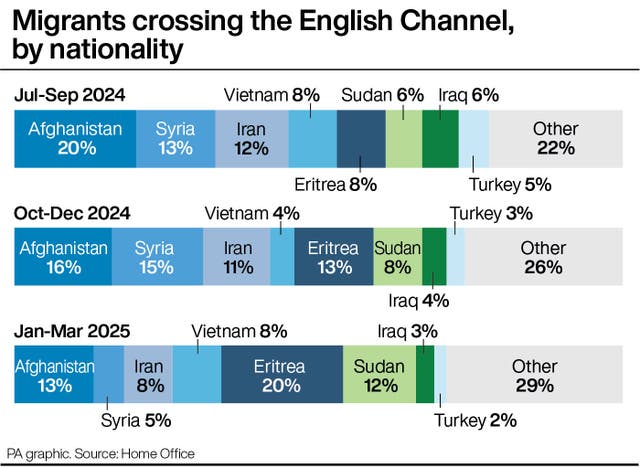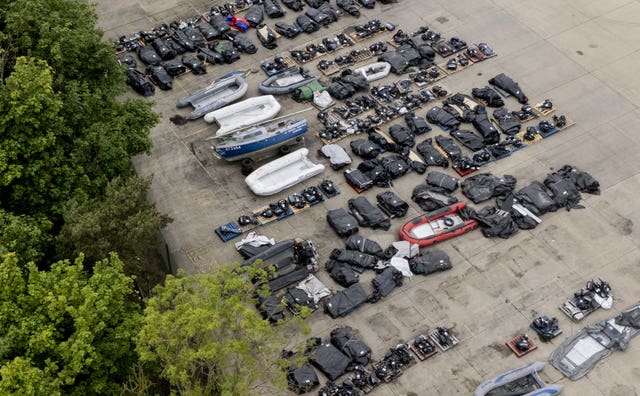Eritreans now most common nationality of migrants crossing Channel
It is the first time Eritrea has accounted for the largest number of people making the journey per quarter.

Eritreans have become the most common nationality of migrants arriving in the UK after crossing the English Channel, new figures show.
Some 1,291 arrivals in the first three months of 2025 were from the East African country, 20% of the 6,420 whose nationality was known.
It is the first time Eritrea has accounted for the largest number of people making the journey per quarter.
The figure is up from 13% in October-December 2024 and 8% in July-September.
In both of those quarters Afghan was the most common nationality.
It comes as 825 migrants arrived in the UK on Wednesday after crossing the Channel, the highest number on a single day so far this year.
The cumulative number of arrivals by small boats in 2025 now stands at a provisional total of 13,573, 37% higher than at the same point last year.
The latest data of the nationality of migrants has been published by the Home Office.
It shows that Afghan nationals made up the second largest group of arrivals in January to March of this year, accounting for 13% of the total, compared with 20% for Eritrea.
This was followed by people from Sudan (12%), Vietnam (8%) and Iran (8%).

The rise in Eritrean migrants is the most recent example of a change in the mix of nationalities making the journey in small boats.
Vietnamese was the most common nationality in both January to March and April to June 2024, accounting for 20% and 15% of arrivals respectively.
In response, the then Conservative government signed an agreement with Vietnam to step up efforts to discourage illegal travel to the UK.
The two countries committed to develop a joint action plan to tackle human trafficking, as well as increase intelligence-sharing and raise awareness of legal routes for migration.
The proportion of arrivals from Vietnam subsequently fell to 8% in July-September and 4% in October-December, though it rose to 8% in January-March this year.

Following a spike in summer 2022 in the number of Albanians arriving in the UK on small boats, the governments of both countries struck an agreement to work together to prevent people from making the journey.
This included placing UK Border Force staff in Tirana airport in the capital of Albania, an exchange of senior police officers and the creation of a joint migration task force.
Albanian nationals accounted for 28% of arrivals in 2022 but only 3% in 2023 and 2% in 2024.
The latest figures on Channel crossings also show that nearly all the 6,420 migrants arriving in the first three months of this year whose nationality was known went on to make a claim for asylum (6,369 or 99%).
Since the start of 2018, when data on Channel crossings was first recorded, 94% of migrants arriving in the UK this way have claimed asylum, or 145,834 out of 154,354 people.
Of the 145,834 to claim asylum, 59% (86,646) have received a decision on their claim, and 39% (56,605) have been granted asylum or some other protection status.
Migrants arriving by boat across the Channel accounted a third of the total number of people claiming asylum in the UK in the year ending March 2025.





